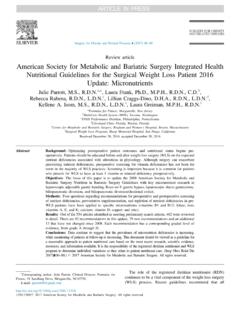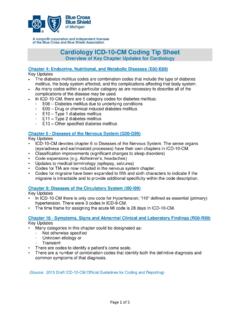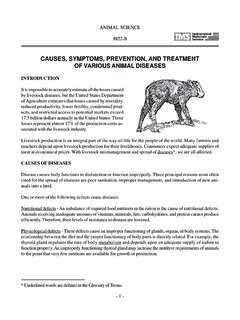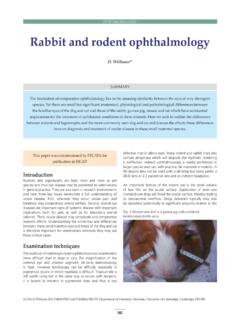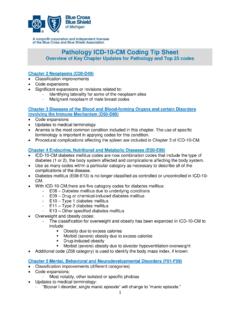Transcription of GP Guidance: Management of nutrition following bariatric ...
1 GP guidance : Management of nutrition following bariatric surgery August 2014 GP guidance : Management of nutrition following bariatric surgery Introduction Patients who are morbidly obese will have struggled with their weight for many years before going forward for bariatric surgery. Whilst bariatric surgery is an aid to weight loss, dietary and behavioural changes are essential for achievement of good outcomes including weight maintenance. All bariatric procedures affect nutritional intake and some procedures may affect the absorption of macronutrients and / or micronutrients. Patients will be required to stay on lifelong nutritional supplements and have lifelong monitoring of their nutritional status. This guideline assumes that the bariatric centre will provide the first two years of follow up for the patient before discharging back to the care of the General Practitioner.
2 Weight loss procedures and impact on nutrition The main bariatric surgery procedures are the gastric band, gastric bypass and sleeve gastrectomy with the duodenal switch being less frequent. In the initial stages after surgery, patients are advised to start on a liquid diet, before progressing onto pureed food, soft food and then more normal textured food. At two years, the patient should be able to manage a wide range of textures of foods but may still report difficulties with some. It should not be assumed that all patients are eating a well balanced diet. Hopefully many will be however some may have maladaptive eating behaviours resulting in a poor nutritional intake. Recommended nutritional supplements As nutrition is compromised with bariatric surgery, it is recommended that patients take nutritional supplements lifelong in addition to having a balanced diet.
3 It is important that compliance with supplements is checked regularly. Table 2 shows the usual recommended nutritional supplements, but it should be noted that patients may have different requirements. Although patients who have a gastric band should be able to eat a nutritionally balanced diet, many will be advised to routinely take a multivitamin and mineral supplement. The patient s bariatric centre should provide full details of the patient s nutritional requirements and supplements. For further information, please refer to the British Obesity and metabolic Surgery Society (BOMSS) guidelines (O Kane et al 2014). GP guidance : Management of nutrition following bariatric surgery August 2014 Table 1: Impact of surgery on nutrition Surgical procedure Impact on nutrition Gastric band No impact on absorption. Over tight gastric band affects nutritional quality of diet including protein and iron Sleeve gastrectomy May be some impact on absorption including iron and vitamin B12 Gastric bypass Impacts on absorption of iron, vitamin B12, calcium and vitamin D Long limb bypasses may affect absorption of protein, fat, vitamin A and trace elements in addition Duodenal switch Impacts on absorption of protein, fat, calcium, fat soluble vitamins A, D, E and K, zinc Table 2.
4 nutritional supplements (routine) nutritional supplement Surgical procedure Sleeve Gastrectomy Gastric bypass Duodenal switch Multivitamin and mineral Yes Yes Yes Iron Yes Yes Yes Folate As part of multivitamin and mineral As part of multivitamin and mineral As part of multivitamin and mineral Vitamin B12 Yes (1) Yes Yes (1) Calcium and vitamin D Yes Yes Yes Zinc and copper As part of multivitamin and mineral As part of multivitamin and mineral As part of multivitamin and mineral. Additional may be needed Selenium As part of multivitamin and mineral As part of multivitamin and mineral As part of multivitamin and mineral Additional fat soluble vitamins No No Yes (1) May be variation between centres as to whether routine supplementation with vitamin B12 following the sleeve gastrectomy or duodenal switch GP guidance : Management of nutrition following bariatric surgery August 2014 Blood tests following surgery Continued nutritional monitoring is essential following bariatric surgery to ensure that patients do not develop nutritional problems in the longer term.
5 It must be not assumed however that abnormal blood results are always directly related to the surgery itself. Table 3 shows the recommended blood tests which should be done annually as a minimum for the sleeve gastrectomy, gastric bypass and duodenal switch. following the gastric band, if there is any suspicion that the patient is not adhering to a nutritionally balanced diet, appropriate blood tests should be done. Table 3: Annual blood tests following bariatric surgery Blood tests Surgical procedure Sleeve Gastrectomy Gastric bypass Duodenal switch Liver function tests Yes Yes Yes Full Blood Count Yes Yes Yes Ferritin Yes Yes Yes Folate Yes Yes Yes Vitamin B12 Yes (1) Yes (1) Yes (1) Calcium Yes Yes Yes Vitamin D Yes Yes Yes Parathyroid hormone Yes Yes Yes Vitamin A No Possibly (2) Yes Zinc, copper Possibly (3) Yes (3) Yes (3) Selenium No (3, 4) No (3, 4) No (3, 4) (1) If patient is having three monthly intramuscular injections of vitamin B12, there may be no need for annual checks (2) If the patient has a long limbed bypass, symptoms of steatorrhoea or night blindness (3) Measure when concerns for example, if screening for iron deficiency anaemia is negative, hair loss, pica, neutropaenia (4) Measure when concerns for example, cardiomyopathy, chronic diarrhoea GP guidance .
6 Management of nutrition following bariatric surgery August 2014 nutritional deficiencies what to look for Protein malnutrition / protein energy malnutrition Protein malnutrition can occur for a number of reasons including poor dietary choice, an over tight gastric band, anastomotic stricture or protein malabsorption. It may present several years following surgery. Protein energy malnutrition is accompanied by oedema. In all cases of suspected protein malnutrition the patient must be fast tracked back to the bariatric centre. Anaemia Iron deficiency anaemia Whilst iron deficiency anaemia is relatively common following the gastric bypass, it must not be assumed that this is the only cause. Other causes should also be considered and investigated if appropriate. If additional oral iron does not correct the iron deficiency anaemia, parenteral iron or blood transfusions may be necessary.
7 Ensure that the patient maintains levels with oral iron supplements. These should be taken with meals or drinks containing vitamin C to aid absorption and at a different time to calcium supplements. If the anaemia is not due to iron deficiency or blood loss, other nutritional causes should be considered. These include folate, vitamin B12, zinc, copper and selenium. Folate and vitamin B12 Low folate levels may be an indication of noncompliance with multivitamin and mineral supplements. However, it could also be an indication of severe malabsorption especially if there are other nutritional deficiencies. Megaloblastic anaemia is caused by folate deficiency or vitamin B12 deficiency. Vitamin B12 deficiency, if untreated, results in irreversible peripheral neuropathy. Therefore it is essential that vitamin B12 deficiency is considered before recommending additional folic acid.
8 Those patients who are vitamin B12 deficient should have levels corrected with intramuscular injections of vitamin B12. Once corrected, three monthly injections of 1mg vitamin B12 will maintain levels. Calcium, vitamin D and parathyroid hormone levels Vitamin D deficiency may result in secondary hyperparathyroidism to maintain calcium levels. Clear recommendations for the Management of vitamin D deficiency are given in the National Osteoporosis guidelines: Vitamin D and Bone Health: A practical clinical guideline for patient Management (Francis et al 2013). Vitamin A Patients who have steatorrhoea or who have had a duodenal switch may be at risk of vitamin A deficiency. Certainly, duodenal switch patients should be on extra fat GP guidance : Management of nutrition following bariatric surgery August 2014 soluble vitamins. Despite this, vitamin A levels may drop over time. Changes in night vision may be an indication of vitamin A deficiency.
9 If the patient has vitamin A deficiency, oral supplementation with vitamin A is needed. Zinc, copper and selenium Unexplained anaemia, poor wound healing, hair loss, neutropaenia, peripheral neuropathy or cardiomyopathy may be symptoms of zinc, copper or selenium deficiency and so levels should be checked if there are any concerns. Zinc and copper share a common pathway so supplementation with zinc can induce copper deficiency and vice versa. Information about any additional over the counter supplements the patient may be taking is essential. If additional zinc supplementation is required, a ratio of 1 mg copper for every 8 to 15 mg zinc must be maintained. Steatorrhoea Patients who have had a duodenal switch or long limbed gastric bypass are at the greatest risk of malabsorption and steatorrhoea. Consequently these patients may develop protein malnutrition and become deficient in fat soluble vitamins and zinc, if there are any concerns regarding the nutritional status of these patients.
10 When to request specialist biochemical / nutritional advice or to refer your patient: Diagnosis and Management of micronutrient deficiency syndrome can be complex and so when in doubt it is recommended that specialist advice is sought. The following are examples of situations where this is appropriate. 1. Newly identified biochemical deficiency, where there is differential diagnosis (there can be causes other than previous bariatric surgery) or its appropriate investigation and treatment are uncertain. 2. Unexplained symptoms that may be indicative of underlying micronutrient / trace element deficiencies. 3. Women who have undergone previous gastric bypass, sleeve gastrectomy or duodenal switch surgery and who are planning to become pregnant or who are pregnant. Further information The BOMSS publication Guidelines on perioperative and postoperative biochemical monitoring and micronutrient replacement for patients undergoing bariatric surgery contains further information.


